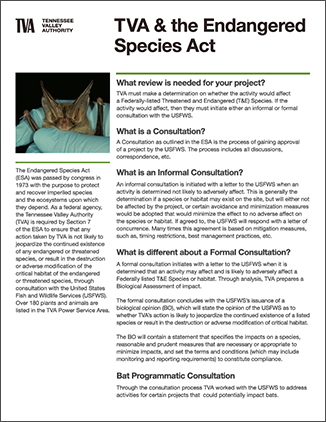Preserving Wildlife Habitat
More than 181,000 acres under TVA's management have been set aside for natural resource management—including the enhancement of wildlife habitat.
TVA manages about 60 percent of this land; the other 40 percent is managed by other agencies, such as state wildlife areas or refuges.
Natural Heritage Project
TVA, with the help and support of the Nature Conservancy, launched the Natural Heritage Project in 1976 to analyze and manage biodiversity on TVA lands and to improve compliance with federal environmental regulations. The project maintains data on threatened and endangered plant and animal species in TVA's power service area, which includes all of Tennessee and parts of six surrounding states.
Natural Heritage Project Fieldwork
The project also conducts fieldwork aimed at protecting threatened and endangered species and environmentally sensitive sites. In addition, it maintains databases on geological features, natural areas and other sensitive natural resources. Since its inception, the Natural Heritage Project has provided environmental input on TVA activities that range from transmission-line construction to economic development.
To Report Rare Species
If you’d like to report a sighting of a rare species, please download the Rare Species Observation Form, which can be printed out and mailed or faxed to TVA. The form is available in two formats:
Include any available photographs, slides, negatives or digital images. All submitted material will be used as physical documentation of a sighting and, unless otherwise stated, will be assumed to be the property of the Tennessee Valley Authority.
TVA Natural Areas
In managing the publicly owned land in and around its facilities and reservations, TVA has developed a land-use designation system under which 82 sites on 10,700 acres have been classified as TVA Natural Areas. The sites are identified as Habitat Protection Areas, Small Wild Areas, Ecological Study Areas or Wildlife Observation Areas. Their management includes restrictions on activities that might endanger significant natural features.
